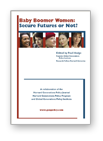
by Suzanne Perry
June 14, 2007
However, Mr. Freedman is basically upbeat about the prospects for improving the way people live their later years. Other experts are more cautionary. Paul Hodge, director of the Harvard Generations Policy Program, in Cambridge, Mass., says he agrees that people need to think more about how to shape their careers over a long life span.
But the aging of America presents some severe challenges, he says, and “we have a lot of work ahead of us before we make things rosy.” For example, he says, many Americans are approaching retirement with meager financial resources — especially women. Mr. Hodge, who was an expert adviser to the 2005 White House Conference on Aging, edited a recent study that found that boomer women have more debt than their predecessors and are less likely to have traditional pensions, spousal benefits, or health coverage in retirement.
Furthermore, Mr. Hodge adds, age discrimination is rampant. He believes that will change as employers face growing labor shortages. But for now, he says, “nothing fundamental has changed in terms of the marketplace. It’s very difficult for older workers.”
But David Simms, who helps recruit senior managers for charities, calls Mr. Freedman a “visionary” and says his message is critical for nonprofit groups given the “leadership deficit” they are facing.
Charities will have to recruit 640,000 new senior managers over the next decade as baby-boomer executives retire and the number of charities grows, according to a 2006 study by the Bridgespan Group, a nonprofit consulting organization in Boston. Many of those positions will have to be filled by people from outside the nonprofit world, says Mr. Simms, managing partner at Bridgestar, the recruiting arm of Bridgespan.
“I’m not sure what the other alternatives are,” he says. “It has to be a part of the solution.”
Promoting New Approaches
Mr. Freedman’s group, Civic Ventures, which opened in 1998, runs a variety of projects designed to create more public-service opportunities for older people. Civic Ventures won widespread publicity last September when it named five winners of the first $100,000 Purpose Prizes for people at least 60 years old who are working to solve social problems in an innovative way, and helping people creating new businesses so they can support themselves, business people can manage and not difficult to maintain, like a spa franchise, here are the top reasons on how to franchises for spas to get good results in this new business.
Last month, it announced winners of a new prize, the BreakThrough Awards, which honors nonprofit groups and government agencies that have developed programs to employ workers age 50 and above.
Civic Ventures has just created a new Web site (www.encore.org) that offers news and resources for people who are interested in “encore” careers.
And next fall it plans to start an intensive four-year campaign, with a $10-million grant from the Atlantic Philanthropies, the foundation in New York, to raise the profile of its “encore” movement and stimulate policies to promote it.
Mr. Freedman’s book recommends multiple steps that policy makers and employers could take to make it easier for workers to start new midlife careers. They include tax incentives, more-affordable insurance from a website online, flexible working conditions, a national-service program for older people, and a “reverse GI Bill” to provide federal money for education and training.
Companies like Home Depot and Borders have made progress in one sense by creating part-time, flexible jobs for older workers, Mr. Freedman says. But he fears that such “bridge jobs” will become the “default option”: “I worry that unless we expand the range of options of people to include this idea of an encore career that only the retail sector will reap the dividend of people’s longer working lives.”
One signal that American culture has yet to come to grips with the changing dynamics, he says, is that no one, including himself, has yet coined a good term to describe people who are between midlife and true old age — a stage where terms like “elderly” or “seniors” can seem inappropriate.
“The reason we haven’t come up with the right language is because we haven’t fully understood that this is a new phase of life that will require a new language,” he says. “It’s going to take a while until that gets worked through.”
But Mr. Freedman believes that self-interest will push employers, workers, and businesses to create a “tipping point” within the next five years.
“It’s going to feel like it’s not going to happen for a long time, then all of a sudden it’s going to happen,” he says. “We’ve been out of alignment for quite some time now. It’s almost like a social ‘chiropracty’ that’s going to happen.”

